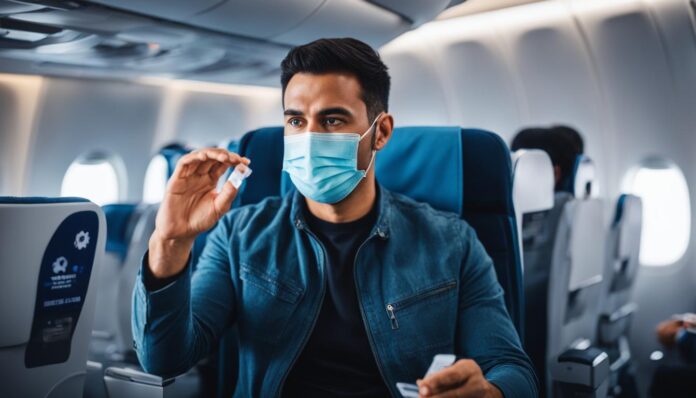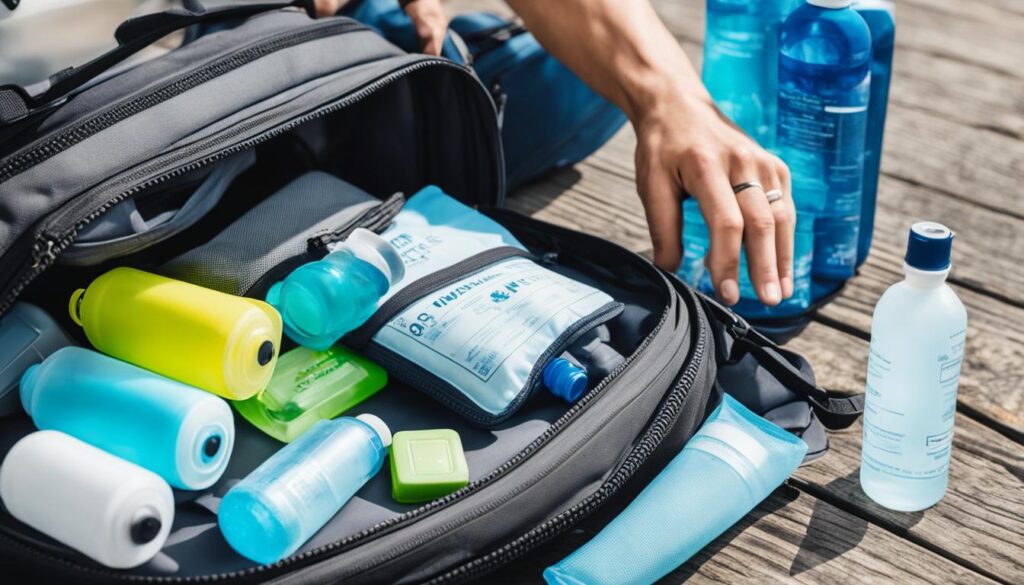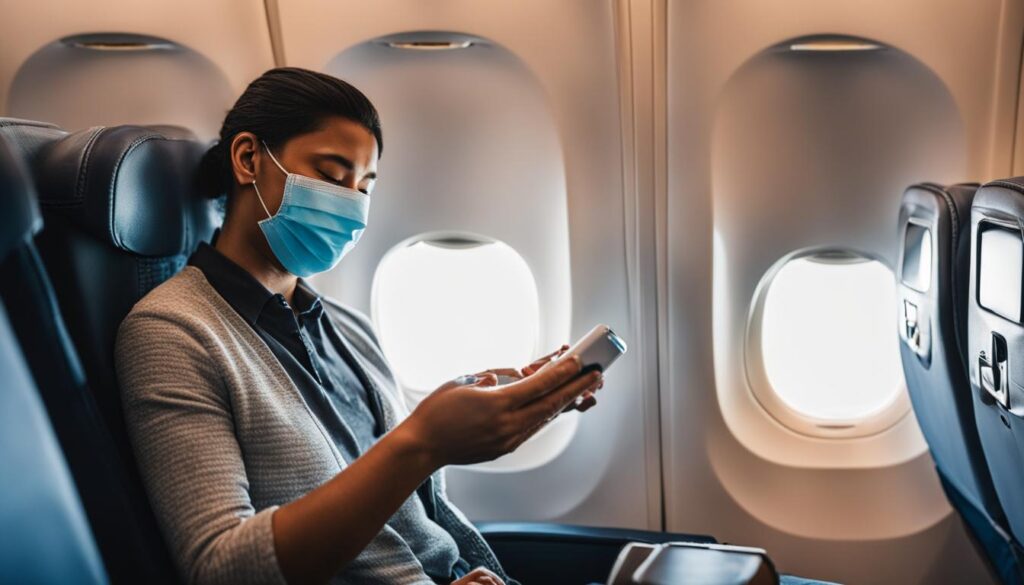Travelling is one of life’s greatest pleasures, but it also comes with risks, including potential health hazards. To ensure you enjoy your journey without any major health problems, it’s crucial to take precautions before and during your travel. By following some simple travel health tips, you can minimize the risk of falling ill during your journeys.
In this section, we’ll provide you with the best strategies to stay healthy while traveling while listing some of the common travel-related issues. Additionally, we will explore the essentials of healthy travel practices and ways to keep up your energy levels, including tips for packing a travel health kit.
Don’t let the possibility of illness put a damper on your journey. Keep reading to discover how to stay healthy while traveling.
Understanding Common Travel-Related Illnesses
Before you can take preventative measures, it’s important to understand the common travel-related illnesses you may encounter on your journeys. By being aware of these, you can take steps to maintain good health while on the road and minimize the risks of falling ill.
Common Travel Sicknesses
Some of the most common travel sicknesses include:
| Illness | Description | Symptoms |
|---|---|---|
| Jet Lag | A temporary sleep disorder caused by crossing time zones | Fatigue, insomnia, irritability |
| Motion Sickness | Occurs when the inner ear and eyes send conflicting signals to the brain | Dizziness, nausea, vomiting, headache |
| Diarrhea | Usually caused by consumption of contaminated food or water | Stomach cramps, frequent loose or watery stools, dehydration |
| Malaria | A mosquito-borne disease prevalent in tropical regions | Flu-like symptoms, fever, chills, headache, muscle pain |
Other common illnesses travelers may face include respiratory infections, altitude sickness, and skin irritations. These illnesses can be caused by a variety of factors such as climate, exposure to new allergens, and inadequate rest.
By taking measures to prevent these common illnesses and remaining vigilant about your health while traveling, you can maintain good health and enjoy your adventures. In the next section, we will delve into pre-travel health planning and consultations.
Pre-Travel Health Planning and Consultations
Before embarking on your journey, it is essential to seek pre-travel health consultations to protect your health and ensure a safe trip. Schedule a visit to your healthcare provider or a travel medicine specialist at least four to six weeks before departure to allow enough time for vaccination recommendations and other health precautions specific to your destination.
During your consultation, inform your healthcare provider about your travel plans, including the countries you will be visiting, the mode of transportation, and the duration of your trip. Based on your itinerary and medical history, your healthcare provider may recommend the following travel vaccination recommendations:
| Vaccine | Recommended for |
|---|---|
| Tetanus-diphtheria | All travelers |
| Hepatitis A | All travelers except those with natural immunity |
| Typhoid | All travelers except those visiting only urban areas and staying in accommodations with safe food and water |
| Yellow fever | Travelers visiting countries with risk of yellow fever transmission |
In addition to vaccination recommendations, your healthcare provider can provide travel safety guidelines and health precautions to help you stay healthy during your trip. These may include advice on preventing insect bites, avoiding contaminated food and water, and managing altitude sickness, among others.
Remember to carry an adequate supply of prescription medications and other essential items in your travel health kit. Be sure to include appropriate over-the-counter medications, such as pain relievers, antidiarrheals, and motion sickness medication, as well as insect repellents, sunscreen, and first-aid supplies.
By seeking pre-travel health consultations and following recommended vaccination and health precautions, you can protect your health and ensure a safe and enjoyable trip.
Healthy Travel Practices
Staying healthy while on the road is crucial for preventing travel-related illnesses. Adopting healthy travel practices can help minimize the risk of falling ill and ensure a pleasant travel experience. Here are some tips and strategies to help you avoid common travel ailments:
- Practice good hygiene: Regularly wash your hands with soap and water, avoid touching your face, and carry hand sanitizer.
- Stay hydrated: Drink plenty of water to prevent dehydration, especially when traveling by plane.
- Maintain a balanced diet: Eat a variety of healthy foods to boost your immune system and stay energized.
- Exercise: Stay active while on the road by taking a walk or practicing yoga.
- Get enough sleep: Aim for at least 7-9 hours of sleep each night to help your body stay healthy and rested.
Remember to also be mindful of your surroundings and take precautions when traveling in areas with a higher risk of illness. By following these tips and building healthy routines, you can enjoy a safe and healthy travel experience.
Healthy Travel Packing List
Don’t forget to pack essential items to help you maintain good health while on the road. Here are some items to include in your travel health kit:
| Item | Purpose |
|---|---|
| Hand sanitizer | To kill germs and bacteria when soap and water aren’t available. |
| Sunscreen | To protect your skin from harmful UV rays. |
| Insect repellent | To prevent insect bites and potential illnesses such as Zika and malaria. |
| First aid kit | To treat minor injuries and illnesses, such as cuts, scrapes, and headaches. |
| Prescription medications | To manage pre-existing health conditions and potential illnesses. |
Having these essential items on hand can help you stay prepared and prevent travel-related illnesses.
Packing a Travel Health Kit
Traveling can be unpredictable, and you never know when you might fall ill. Packing a travel health kit is a smart way to prepare for any health emergencies that may arise. Here are some essential items to include in your travel health kit to ensure you stay well on the road:
| Item | Purpose |
|---|---|
| First-aid kit | For treating minor injuries and wounds |
| Prescription medications | To manage any existing medical conditions you have |
| Pain relievers | For headaches and muscle pain |
| Anti-diarrheal medication | To treat stomach issues |
| Antibacterial ointment | To prevent infections |
| Insect repellent | To prevent mosquito bites and the transmission of diseases |
| Sunscreen | To protect your skin from harmful UV rays |
| Hand sanitizer | To maintain good hygiene and prevent the spread of germs |
| Reusable water bottle | To stay hydrated and reduce waste |
Having these items in your travel health kit can help you stay comfortable and healthy during your journeys. Additionally, it’s important to research any travel health precautions specific to your destination, such as recommended vaccinations or medical facilities available in the area.
Remember to always consult with your doctor or a travel health specialist before traveling to discuss any specific health concerns or precautions you should take.
Food and Water Safety Tips
When traveling, it’s important to take precautions to prevent food and waterborne illnesses. By following these travel health tips, you can protect yourself from getting sick:
- Drink only bottled or disinfected water, and avoid ice made from tap water.
- Avoid consuming raw or undercooked food, especially meat, seafood, and eggs.
- Stick to hot, cooked foods and fruits and vegetables that can be peeled before eating.
- Choose reputable food vendors and restaurants that have a good track record of food safety.
- Wash your hands frequently, especially before eating or handling food.
It’s also a good idea to pack a portable water filter or water purification tablets in your travel health kit. These can be used to treat water in emergency situations where bottled water or other safe water sources are not available.
What to do if you get sick
If you do become ill while traveling, it’s important to seek medical attention as soon as possible. Some warning signs of food or waterborne illnesses include diarrhea, fever, abdominal pain, vomiting, and dehydration.
If you experience any of these symptoms, drink plenty of fluids, rest, and seek medical attention immediately. In some cases, antibiotics may be prescribed to help treat the illness.
If you’re traveling to a country with a high risk of food or waterborne illnesses, consider getting vaccinated for diseases like cholera, hepatitis A, and typhoid fever.
By staying vigilant and following these food and water safety tips, you can prevent travel-related illnesses and enjoy your travels without worry.
Managing Travel Stress and Jet Lag
Traveling can often be stressful and lead to exhaustion and jet lag. But with the right approach, you can combat such effects and stay well on the road. Below are some relaxation techniques and tips to manage travel stress and jet lag:
- Stay hydrated: Drinking plenty of water and avoiding alcohol and caffeine can help reduce the effects of jet lag on your body.
- Get enough rest: Trying to get enough sleep before your flight and during your journey can help alleviate stress and reduce the impact of jet lag.
- Exercise: Regular exercise, even light physical activity, can help boost your mood and maintain good health during travel.
- Take breaks: If possible, take breaks during long drives or flights to stretch your legs or take a walk. This can also help combat the negative effects of long periods of sitting.
- Practice relaxation techniques: Deep breathing, yoga, or meditation can help reduce stress and improve your overall well-being while on the road.
By adopting these techniques and staying proactive in managing travel stress and jet lag, you can stay well on the road and make the most of your journey.
Don’t forget that staying healthy during travel can require effort, but it pays off, allowing you to enjoy your journey to the fullest.
Staying Active and Exercise Tips
Traveling can often disrupt your daily exercise routine, but staying active is still essential to maintain good health on the road. Here are some tips to help you stay on track with your fitness goals during your travels:
- Use the hotel gym or pool if available
- Walk or bike instead of taking public transportation or taxis
- Do bodyweight exercises in your hotel room, such as push-ups, squats, and planks
- Take advantage of outdoor activities, such as hiking, swimming, or yoga on the beach.
Remember to start slowly and listen to your body to avoid injury. Incorporating exercise into your travel routine will not only improve your physical health but also reduce stress and improve mental well-being.
Fitness Routine
Set a fitness routine for your travels that aligns with your exercise preferences and goals. Consider packing lightweight equipment, such as resistance bands or jump ropes, to add variety to your workout. Ensure you have comfortable and appropriate attire and footwear for your chosen activities.
“Travel is not an excuse to abandon your fitness regimen. Instead, see it as an opportunity to explore new workout routines and exercises.”
–Michael Jordan
Conclusion
By following the essential tips and strategies we have provided in this article, you can protect your health and ensure a safe and enjoyable travel experience. Remember to plan ahead by seeking pre-travel health consultations and packing a travel health kit. Adopt healthy practices such as practicing good hygiene, staying hydrated, and maintaining a balanced diet.
It is also important to be proactive in taking care of your well-being on the road by identifying safe food and water sources and managing travel stress and jet lag. Maintaining an active lifestyle while traveling is also crucial for your overall well-being.
Take the necessary precautions and stay aware of your surroundings to prevent travel-related illnesses and stay healthy during your journeys. Safe travels!

















































